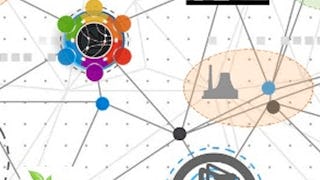Resilience & Leadership: Concepts, Definitions, & Frameworks is the first course in the specialization ‘Resilience Engineering and Leadership in Crisis’. The course introduces the common terms, definitions, and concepts that characterize resilient systems. Frameworks for resilience engineering and leadership in crisis are applied to complex systems and the built environment. Learners will explore a holistic approach to critical infrastructure resilience and apply a hazard and threat assessment protocol to a project scenario.


您将学到什么
Define resilience and explain the meaning of the built environment.
Outline a holistic approach to resilience of critical infrastructure systems.
Apply resilience and crisis management frameworks to complex scenarios.
Interpret how ethics may enhance or diminish adaptive capacity.
您将获得的技能
- Complex Problem Solving
- Crisis Management
- Risk Management
- Industrial and Organizational Psychology
- Leadership Studies
- Systems Thinking
- Emergency Response
- Disaster Recovery
- Business Ethics
- Case Studies
- Threat Management
- Decision Making
- Resilience
- Hazard Analysis
- Safety and Security
- Organizational Effectiveness
- Threat Detection
- Infrastructure Security
要了解的详细信息

添加到您的领英档案
5 项作业
了解顶级公司的员工如何掌握热门技能

积累特定领域的专业知识
- 向行业专家学习新概念
- 获得对主题或工具的基础理解
- 通过实践项目培养工作相关技能
- 获得可共享的职业证书

该课程共有5个模块
Welcome to the first course of the Resilience & Leadership series. We will get started right away by defining key concepts that will be touched upon throughout this course: resilience, resilience engineering, the built environment, and critical infrastructure. After, you will see examples of the four cornerstones of resilience that can characterize the response of a complex system to unanticipated disruptions. You will consider multiple perspectives of resilience that present an alternative to traditional risk analysis. Then, we'll discuss a holistic approach to resilience using an Integral framework. The framework is an important tool that will be referenced throughout this specialization, and applies directly to Resilience Engineering and Leadership in Crisis. Let's get started!
涵盖的内容
6个视频7篇阅读材料1个作业1次同伴评审
This module introduces more resilience concepts, tools, and frameworks. First, we’ll examine an expansion of Hollnagel’s work with four socio-technical processes to describe the resilience of a complex system. You will be introduced to the definition of a crisis, and a framework for crisis management as a strategic process. The framework covers landscape survey, strategic planning, crisis management, and organizational learning from both internal and external perspectives. Finally, we’ll continue our review of critical infrastructure resilience policy framework established by the DHS (Department of Homeland Security).
涵盖的内容
6个视频6篇阅读材料1个作业1次同伴评审
Sully Sullenberger's landing on the Hudson River is an example of resilience during a crisis and can teach us many things. In this module, we’ll discuss the event and how a ‘human-in-the-loop’ can contribute adaptive capacity amid catastrophic system failure. We’ll go on to examine the crisis management landscape and normal accident theory in relation to known and unknown threats, hazards, and transboundary impacts. You'll compare organizational and societal crises with natural and man-made disasters. Finally, a DHS protocol for identifying and assessing threats will be introduced.
涵盖的内容
8个视频9篇阅读材料1个作业1次同伴评审
This module explores business ethics in relation to crisis events. We will discuss the role of ethics in crisis leadership and examine a mini-case of the Hawk's Nest Tunnel Disaster of the 1930s. The module presents ethics in a context of the crisis management framework and describes how organizational learning can affect policy. One assignment for this module provides an opportunity to reflect on lessons learned from the Deepwater Horizon event.
涵盖的内容
7个视频6篇阅读材料1个作业1次同伴评审
In this module, we’ll examine some of the patterns that emerge when adaptive (complex) systems fail. Patterns of maladaptation can also be observed like decompensation, working at cross-purposes, or getting stuck in outdated behaviors. We’ll also look at sources of organizational crisis in more detail. Different types of internal and external forces can impact the safety, security, and resilience of an organization. Other considerations include industry and organizational life-cycle crises. Finally, we’ll talk about human resilience and development in relation to critical infrastructure resilience.
涵盖的内容
8个视频8篇阅读材料1个作业1次同伴评审
获得职业证书
将此证书添加到您的 LinkedIn 个人资料、简历或履历中。在社交媒体和绩效考核中分享。
攻读学位
课程 是 University of Colorado Boulder提供的以下学位课程的一部分。如果您被录取并注册,您已完成的课程可计入您的学位学习,您的学习进度也可随之转移。
位教师

从 Environmental Science and Sustainability 浏览更多内容
 状态:免费试用
状态:免费试用University of Colorado Boulder
 状态:免费试用
状态:免费试用University of Colorado Boulder
 状态:免费试用
状态:免费试用University of Colorado Boulder
 状态:免费试用
状态:免费试用University of Colorado Boulder
人们为什么选择 Coursera 来帮助自己实现职业发展




常见问题
To access the course materials, assignments and to earn a Certificate, you will need to purchase the Certificate experience when you enroll in a course. You can try a Free Trial instead, or apply for Financial Aid. The course may offer 'Full Course, No Certificate' instead. This option lets you see all course materials, submit required assessments, and get a final grade. This also means that you will not be able to purchase a Certificate experience.
When you enroll in the course, you get access to all of the courses in the Specialization, and you earn a certificate when you complete the work. Your electronic Certificate will be added to your Accomplishments page - from there, you can print your Certificate or add it to your LinkedIn profile.
Yes. In select learning programs, you can apply for financial aid or a scholarship if you can’t afford the enrollment fee. If fin aid or scholarship is available for your learning program selection, you’ll find a link to apply on the description page.
更多问题
提供助学金,

 中
中

